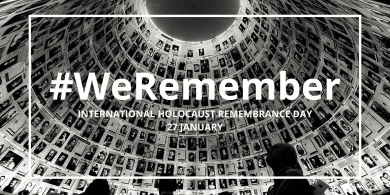UN Special Rapporteur: Antisemitism is a serious obstacle to the enjoyment of the right to freedom of religion or belief
In the report, which stands out as the first UN human rights report focused on antisemitism, it is noted with serious concern that the frequency of antisemitic incidents appears to be increasing in magnitude in several countries.

Antisemitism is described as “toxic to democracy” in the 2019 report prepared by Dr. Ahmed Shaheed, The United Nations (UN) Special Rapporteur on Freedom of Religion or Belief, to draw attention to discrimination based on religion or belief and to combat antisemitism. The report stands out as the first UN human rights report focused on antisemitism. Shaheed notes with serious concern that the frequency of antisemitic incidents appears to be increasing in magnitude in several countries.
The Special Rapporteur, identifies violence, discrimination and expressions of hostility motivated by antisemitism as a serious obstacle to the enjoyment of the right to freedom of religion or belief. As Shaheed explores the global phenomenon of antisemitism, he finds that those antisemitic incidents have created a climate of fear among Jewish community. The report examines in detail the dimensions, roots, negative effects, and manifestations of global antisemitism and its reflections on the discourse, including online hate. It also includes recommendations to states, media, civil society and the United Nations on efforts that all stakeholders can make to combat antisemitism and promote religious freedom and pluralism.
It is also indicated in the report that as a result of the increase in antisemitism, members of the Jewish communities in a number of countries have reported that they are increasingly reluctant to display religious attire, such as the kippa, or to carry out public discussions in a traditional language because of the fear of being subject to harassment, discrimination or violence. Moreover, individuals also report abstaining from identifying publicly as Jews, expressing their cultural identity or attending Jewish religious and cultural events, which effectively excludes Jews from public life. In many places, the threats faced by Jewish communities have compelled them to seek or establish extensive security measures for their places of worship, schools and other religious and cultural sites. Therefore, Shaheed urges the governments to combat antisemitism, which not only impairs the human rights of Jews, but also, if left unchecked in any society, poses risks to members of other minority communities and all societies, and will serve to undermine peace and security.
Accordingly, he encourages states to adopt a human rights-based approach in combating antisemitism, as should be done in combating all forms of religious intolerance. In this sense, he urges states to identify, document and prohibit, in law and in practice, the commission of antisemitic hate crimes; to enhance government outreach to Jewish communities; to protect individuals at risk of violence; and to take actions in the areas of education and awareness-raising aimed at curbing the spread of antisemitic views.
Some of the highlights in the report are as follows:
- Amidst an apparent surge in hate motivated by religious animus worldwide, hostility, discrimination and violence motivated by antisemitism have received scant attention as a human rights issue.
- Overall, data collection worldwide is limited, and in many States antisemitic harassment is significantly underreported. Nevertheless, reports of hostility, discrimination and violence motivated by antisemitism have increased in many parts of the world. Official and non-governmental monitors worldwide recorded a significant rise in the number of antisemitic incidents in 2017 and 2018, and reports of violent manifestations of antisemitism (physical attacks with or without weapons) increased by 13 per cent globally in 2018.
- In one survey, covering 12 countries in the European Union, 79 per cent of respondents who had experienced harassment in the five years preceding the survey had not reported abuse, primarily because they believed that nothing would change if they did. In the same survey, it was found that 85 per cent of respondents felt that antisemitism was a serious problem in their respective countries, 34 per cent reported that they avoided visiting Jewish events or sites because of safety concerns, and 38 per cent had considered emigrating because they did not feel safe as Jews.
- Antisemitism, expressed through acts of discrimination, intolerance or violence towards Jews, violates a number of human rights, including the right to freedom of religion or belief. Attacks on synagogues and schools and the desecration of Jewish cemeteries, for example, are explicit infringements that interfere with the concrete realities and practices of an individual’s religious life.
- Aptly termed “the oldest hatred”, prejudice against or hatred of Jews, known as antisemitism, draws on various theories and conspiracies, articulated through myriad tropes and stereotypes and manifested in manifold ways, even in places where few or no Jewish persons live.
- Antisemitic discourse used by neo-Nazis and radical Islamist groups to incite and legitimize antisemitism is increasingly common. Additionally, numerous reports reveal an increase in many countries of what is sometimes called “left-wing” antisemitism, in which individuals claiming to hold anti-racist and anti-imperialist views employ antisemitic narratives or tropes in the course of expressing anger at the policies or practices of the Government of Israel.
- Antisemitic hate speech is particularly prevalent online. A study of online antisemitic hate speech found on Twitter in English revealed 4.2 million antisemitic tweets in one year alone. Publicly prominent Jewish individuals and organizations are also specifically targeted with antisemitic comments online.
- Some official laws and policies violate the right to freedom of religion or belief by affecting the ability of Jewish communities to manifest their religion.
Some of the recommendations of the Special Rapporteur to states, civil society, educators and media against the issues posed are as follows:
- States, civil society, the media and the United Nations should follow a human rights-based approach to combating antisemitism. Such an approach includes implementing measures that foster the development of democratic societies that are resilient to extremist ideologies, including antisemitic propaganda, by fostering critical thinking, empathy and human rights literacy among self-reflective citizens with the requisite proficiency and confidence to peacefully and collectively reject antisemitism and other forms of intolerance and discrimination. It also requires investments in education and training to enhance society-wide literacy with regard to the different ways in which antisemitism manifests itself.
- There is limited research on the gendered aspects of antisemitism. Therefore, states and civil society should ensure that frameworks to address both antisemitism and sexism account for intersecting religious and gendered identities.
- The primary responsibility for addressing acts of intolerance and discrimination rests with states. As such, states should enact laws to prevent discrimination based on religion or belief, including against Jews, under international human rights law, and take appropriate measures to combat discrimination. States must also invest in preventive security measures, compliant with international human rights law, to deter antisemitic hate crimes. States should enact and enforce hate crime legislation that recognizes antisemitism as a prohibited bias motivation and that is clear, concrete and easy to understand. States should put systems, routines and training in place to ensure that relevant officials recognize antisemitic hate crimes and record them as such.
- States should establish data collection systems to document information on antisemitic hate crimes. States should also work with Jewish communities and organizations to strengthen efforts to monitor, document and report on hate crimes and other acts motivated by antisemitism.
- States must also foster freedom of religion or belief and pluralism by promoting the ability of members of all religious communities to manifest their right to freedom of religion or belief, and to contribute to society openly and on an equal footing.
- Civil society organizations should take a multi-stakeholder, multidisciplinary, human rights-based approach to combating antisemitism. Academic experts and researchers can support governments by providing independent expert advice and insights on the prevalence and manifestations of antisemitism, as well as on effective ways to counter it.
- Civil society, including faith-based actors, should also strive to establish collaborative networks to foster mutual understanding and solidarity, promote dialogue and inspire constructive action.
- Educators can develop curricula that raise awareness of human rights and foster empathy through the incorporation of creative exercises and content that challenge and counteract antisemitic attitudes.
- Social media companies should take reports of cyberhate seriously, enforce terms of service and community rules that do not allow the dissemination of hate messages, provide more transparency in their efforts to combat cyberhate and offer user-friendly mechanisms and procedures for reporting and addressing hateful content. They should also report criminal antisemitic behaviour online to relevant local law enforcement agencies, including expression that constitutes incitement to discrimination, hostility or violence.
Please click here to read the full report.



